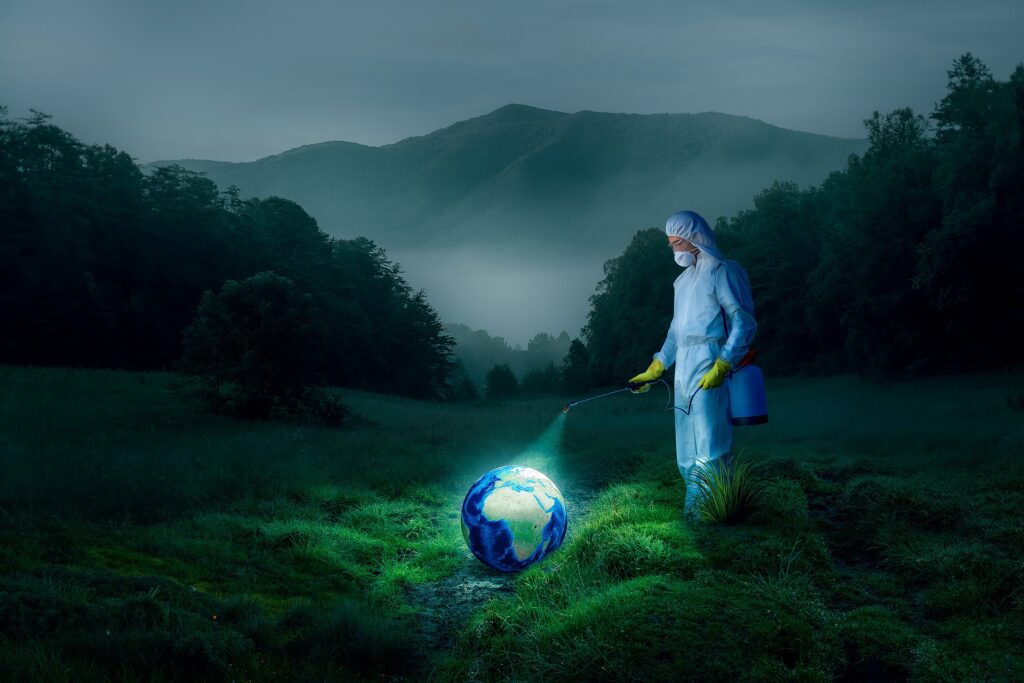As smoke from western wildfires chokes people in Manhattan and unprecedented floods drown subway commuters in China, we’re reminded that scientists warned of these climate change driven consequences decades ago. Some have theorized that if the predicted impacts were more immediate, that humanity would have acted to avert them. The covid crisis may shed light on whether that’s true and whether we are likely to take more bold action to address climate change, now that the truth of those predictions make daily headlines around the world.

The World Health Organization declared Covid-19 an emergency about 16 months ago. Since then, nearly 200 million confirmed cases and over 4 million deaths have been confirmed worldwide, but wearing masks, social distancing, and hundreds of millions of vaccine doses have undoubtedly prevented those numbers from being far higher. The economic toll has been significant, but would also likely be much worse without those measures by governments and health professionals. The final chapter and costs of the pandemic have yet to be written, but what has the global response to this crisis taught us about humanity’s ability to face fast-moving challenges head-on?
Put bluntly, it has taught us that even in plainly obvious life-or-death situations, people will still revert to tribalism and greed. Right-wing politicians in places as diverse as the US, Brazil, and Iran denied covid reality and scoffed at wearing masks with catastrophic results. In the US alone, studies show that as much as 40% of covid deaths could have been avoided if the Trump administration had simply followed the advice of health professionals the way his counterparts in Germany and South Korea, among others, have done. That’s over 200,000 Americans that would still be alive today. Of course Trump is not solely to blame – – right wing media and countless others in the Republican party echoed and amplified his disdain for wearing a mask and lack of leadership for everyone getting vaccinated. Many more will suffer and die because of those who put tribe over community. And greed? What else explains that people in wealthy nations have been vaccinated and are now returning to near-normal life at rates of up to ten times that of poor nations?
If humanity is so self-destructive when a crisis we can largely avert is fast-moving, what hope do we have that it will seriously address the slower-moving impacts of climate change? The obvious conclusion from comparing the responses to these two global challenges is that we are doomed to self-destruction.
But the pandemic has provided evidence of hope too.
Some environmental activists say it’s too late for individual action to solve the climate crisis. Changing a light bulb, driving a more fuel-efficient or electric car, composting food waste, and a myriad of other personal actions just won’t be enough to prevent the worst future consequences of the changing climate, only massive government action to end fossil fuel use and save forests (among other large scale solutions) will do it. But wearing a mask, washing your hands, social distancing, and getting vaccinated are all largely personal choices to limit the damage of the pandemic – – choices made by millions that are saving countless lives.
In the absence of adequate government response to climate change, driven once more by tribalism and greed, it is only the personal choices that are making a difference. Governments have played a role – – in the pandemic, they invested in testing and vaccine development; and in climate solutions they have set mandates and performance standards for lights, buildings, cars, and clean energy. But it is individuals who changed lifestyles and the products they use that has resulted in the modest gains we’re making so far.
And those gains are essential for one critical reason. Scientists tell us we have only a few more years to peak global greenhouse gas emissions and then we need to reduce them by a significant amount each year. The more we do now, the more time we have for solutions with bigger impact to take hold. In other words, much like the pandemic, individual action alone won’t do it, but small actions of millions of people, taken together, can lessen the destruction and grief for many millions more.
Like mask-wearing, the measures each of us can undertake to address the climate crisis are often equally simple, but in the case of climate actions, might even save you some money. Wash your clothes in cold water (detergents work the same as in hot water); eliminate single-use plastic, such as bags and straws, from your life; conserve water (especially in the west, where climate change has made droughts more severe and where water has an enormous carbon footprint from long-distance pumping or desalination); and inflate your car tires properly (saves up to 5% of the fuel and extends the life of the tires) to name just a few things we can do.
Go to the 7th Generation Advisors Personal Climate Action Center for more ideas and, when you take your own actions, think of it as steps toward stopping another very deadly kind of pandemic.